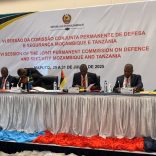CPLP: Mozambique MPs ask for reopening of Guinea-Bissau parliament, but pledge non-interference
Mozambique; EU observer mission head calls for no impunity in case of Matavel murder – AIM report

Photo: Twitter / @SBeneditoEU
The head of the European Union Election Observation Mission to Mozambique, Nacho Sanchez Amor, on Wednesday urged that there should be no impunity for those who assassinated Anastacio Matavel, the civil society and election observation activist who was murdered in the southern city of Xai-Xai just a week before the general and provincial elections held on 15 October.
Giving the final report of the mission at a Maputo press conference, Sanchez Amor said it was his personal conviction that the electoral process would not be truly complete until the trial of the assassins.
ALSO READ: Mozambique: EU condemns elections saying results ‘highly unlikely’ – CIP
Matavel, the Executive Director of the Gaza Provincial Forum of NGOs (FONGA), and Gaza representative of the election observation coalition known as the “Sala da Paz” (Peace Room), was gunned down on 7 October by a death squad consisting of five members of the Special Operations Group (GOE) of the Mozambican police.
Their identities are known because their getaway car was involved in a major traffic accident minutes after the murder, in which two of the assassins died. Two others are now in jail awaiting trial, while the fifth is a fugitive.
The death of Matavel was the most shocking incident in an election campaign marred by violence. The Observation Mission, Sanchez Amor said, is recommending that the authorities “create a safe and intimidation-free environment for the participation of election observes and party representatives”.
The state authorities, the mission said, should also “take responsibility for protecting the full enjoyment of fundamental freedoms of candidates, namely the right to freedom of assembly and to conduct campaign activities in a safe environment, free from violent acts against party members and supporters”.
A @moeuemz19 partilhou hoje o relatório final com a Assembleia da República de Moçambique e com o Tribunal Supremo. O relatório tem 20 recomendações para a melhoria de futuros processos eleitorais.#Mozambique #Moçambique @NachoSAmor @eu_eeas @SBeneditoEU @SDProgressives pic.twitter.com/4tmRoTGBmw
— moeuemz19 (@moeuemz19) February 12, 2020
A @moeuemz19 entregou o relatório final das eleições gerais e das assembleias provinciais do 15 de Outubro de 2019 à Procuradoria-Geral da República, à CNE, ao STAE e ao Conselho Constitucional.#Mozambique #Moçambique @NachoSAmor @eu_eeas @SBeneditoEU @SDProgressives @EUParl_EN pic.twitter.com/dza9c2tPlT
— moeuemz19 (@moeuemz19) February 12, 2020
There were a large number of frauds and irregularities, including ballot box stuffing, observed on election day. The Mission’s report called on Mozambican state institutions, particularly the National Elections Commission (CNE), to “take full responsibility for the integrity of the electoral process by adopting measures to address the consequences of electoral offences and malpractices during voting, counting and tabulation of results to diminish their impact on the election results”.
The EU observers also called for measures to ensure that the police “act impartially and free from political influence at all levels, ensuring that those responsible for violations of human rights and of the rule of law are held accountable”.
The report noted that “insufficient measures were taken to ensure the quality of the vote register”. The main problem was the impossibly high number of voters registered in the southern province of Gaza.
Reunião produtiva do Observador-Chefe, o deputado @NachoSAmor com a #CNE e o #STAE – ele afirmou ser fundamental focarmo-nos na implementação das recomendações do Relatório Final da Missão de Observação Eleitoral em Moçambique. @moeuemz19 pic.twitter.com/jGZqs4CU9w
— Antonio Sánchez-Benedito Gaspar (@SBeneditoEU) February 11, 2020
The registration in Gaza for the previous general elections was 591,194, but in 2019 the registration increased by an extraordinary 97.2 per cent to 1,166,011. This sharply contradicted the 2017 population census undertaken by the National Statistics Institute (INE). Projections from the census showed that the number of people of voting age in Gaza in 2019 could not be more than 836,581. But the voter registration showed an extra 330,000 adults in the province.
This meant that Gaza, the second smallest provincial constituency in 2014, suddenly became the fourth largest constituency. Parliamentary seats are allocated in proportion to the number of registered voters in each province, and the inflated registration gave Gaza an extra eight seats, all of which were won by the ruling Frelimo Party.
Nothing similar happened anywhere else – most other provinces lost or gained one or two seats and their voter registration was broadly in line with the census figures.
The EU Mission suggests that, instead of the current system of re-registering the entire voting population from scratch every five years, there should be a permanent voter register, which is merely updated every election year. This should “enjoy stakeholder confidence and accurately reflect the number of voters in each province”.
As a check on accuracy, there should be “an independent audit of the provisional voter registration data before adoption of a final voter register”.
Troca de ideias franca e positiva com a Presidente do Conselho Constitucional sobre as Eleições Gerais e das Assembleias Provinciais. A #UE está pronta a trabalhar com as autoridades de #Moçambique na implementação das recomendações da @moeuemz19. pic.twitter.com/Uyu0PYC5lA
— Antonio Sánchez-Benedito Gaspar (@SBeneditoEU) February 11, 2020
The report noted the CNE’s reluctance to publish the election results broken down polling station by polling station. The results publicly available are by province and by district. Almost four months after the vote, the CNE has not published individual polling station results.
The EU Mission points out that the availability of results broken down to polling station level “is an important component of transparent elections, as it enhances the trust of all stakeholders by enabling political parties to compare their results with those officially tabulated. It is also becoming a standard in the region as it constitutes international good practice for the conduct of credible elections”.
The report noted that established Mozambican election observation groups ran into difficulties with accreditation, making it impossible for them to carry out observation and parallel vote tabulation (PVT) on the scale initially planned.
Thousands of observers from well-known and credible groups found their credentials were delayed or not issued at all, even though the law states that observer credentials must be issued within five day of receiving the request.
The PVT should have covered 7,000 polling stations, but when the provincial elections commissions refused to issue enough credentials, the number had to be cut back to 4,000.
- The full EU EOM report in Portuguese is HERE.
A @moeuemz19 reuniu-se com as plataformas da sociedade civil que participaram nas Eleições Gerais e das Assembleias Provinciais do passado dia 15 de Outubro para partilhar as recomendações incluídas no relatório final.#Moçambique #Mozambique @NachoSAmor @eu_eeas pic.twitter.com/XL66spJ98C
— moeuemz19 (@moeuemz19) February 11, 2020
1/4. Presenting the @moeuemz19 final report Chief Observer @NachoSAmor called for political will in #Mozambique to implement reforms based on recommendations made, with all actors involved. #UEMoz @eu_eeas pic.twitter.com/cFRlyobyTZ
— Antonio Sánchez-Benedito Gaspar (@SBeneditoEU) February 12, 2020












Leave a Reply
Be the First to Comment!
You must be logged in to post a comment.
You must be logged in to post a comment.